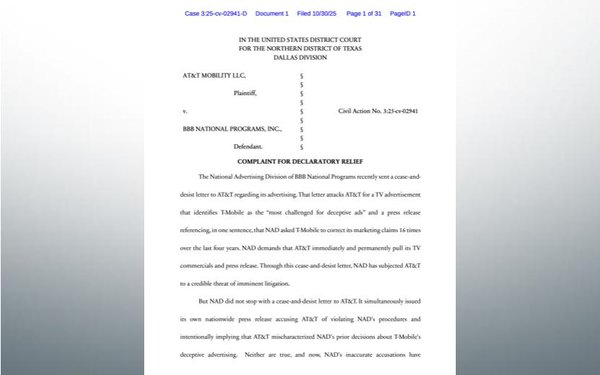
AT&T on
Thursday sued the advertising industry's self-regulatory body over its demand that the company pull the television commercial Ain't Our First Rodeo, which bashes competitor T-Mobile over its ad
claims.
The suit comes just one week after AT&T launched the 30-second spot, in which actor Luke Wilson calls T-Mobile "the master of breaking promises," and accuses it of being "caught up in untruths."
In the ad, Wilson holds up a mock tabloid that carries the headline "T-Mobile Most Challenged For Deceptive Ads," while the bottom of the screen reads: "Based on advertising challenges
of telecommunications providers brought by competitors from 2022 to 2025."
advertisement
advertisement
That ad doesn't mention the self-regulatory group BBB National Programs' National Advertising
Division (NAD) by name, but an accompanying press release states that the watchdog "asked T-Mobile to correct their marketing claims 16 times over the last four years."
Last Friday, one day after AT&T unveiled the ad, the NAD sent the company a cease-and-desist letter demanding the removal of both the commercial and press release. The
self-regulatory watchdog -- which hears challenges to ads by competitors and makes recommendations -- said its
policies prohibit parties to a case from issuing press releases regarding decisions, and from using decisions for advertising or promotional purposes.
AT&T alleges in a complaint filed in
federal court in Dallas that the NAD's "inflammatory and baseless accusations" have "intimidated multiple TV networks into pulling AT&T’s advertisement."
A company spokesperson
declined to elaborate on that allegation.
The carrier also says the NAD's cease-and-desist letter creates a "credible threat of imminent litigation."
AT&T is now
asking a federal judge to declare that its ad and press release don't violate the watchdog's procedures, and that the new campaign is protected by the First Amendment.
The
carrier alleges in its complaint that the statements in the commercial are accurate, adding that the self-regulatory group itself has issued public statements summarizing its decisions regarding
T-Mobile.
"AT&T’s advertisements and press release do not reveal any information that was not already public through NAD’s own press releases," the company
writes.
The NAD declined to comment.